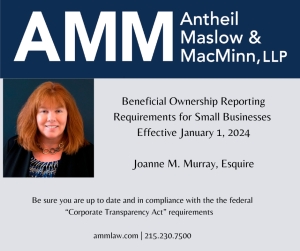The Corporate Transparency Act: Injunction Remains in Place
As we reported in a previous client alert, the U.S. District Court for the Eastern District of Texas issued a nationwide preliminary injunction on December 3, 2024 to stop the Federal government from enforcing the Corporate Transparency Act (the “CTA”) and the regulations implemented under the CTA. The case is captioned as Texas Top Cop Shop, Inc. et al. v. Garland, et al. The government promptly appealed this ruling to the United States Court of Appeals for the Fifth Circuit, which issued an order on December 23rd to stay the injunction (simply put, to reinstate the CTA’s filing requirements). Perhaps in response to this order the Financial Crimes Enforcement Network (FinCEN), the agency charged with enforcing the CTA, extended the filing deadline for companies formed prior to 2024 to January 13, 2025. In a surprising development, a different panel of the Fifth Circuit issued an order on December 26th setting aside the court’s December 23rd order. The Court also scheduled a hearing on the merits of the government’s initial appeal of the District Court order for late March. FinCEN issued a press release on December 28th confirming that the Texas Top Cop Shop injunction remains in effect and that reporting companies are not currently required to file beneficial ownership reports (although voluntary reports are being accepted on the FinCEN website).
What does all of this mean for you? For the moment, reporting companies are not required to file beneficial owner reports and that seems unlikely to change until late March. On December 31st, however, the government filed an application with the United States Supreme Court to lift the injunction (i.e., reinstate the CTA’s filing requirements) pending the outcome of the Fifth Circuit decision, so that timeline may change. As noted in our earlier alert, it is unclear whether FinCEN will provide a grace period or forgo imposing penalties for filings made if the injunction is lifted and the CTA is reinstated. Criminal penalties are severe and include fines of up to $10,000 and/or prison terms of up to two years. FinCEN may also impose civil penalties of up to $591 per day for failure to file. Reporting companies will have to weigh the risks of not filing their beneficial owner reports against the burden of filing those reports.
For more on the Corporate Transparency Act, please visit our website.
The Corporate Transparency Act: Latest Developments
As you probably heard, the U.S. District Court for the Eastern District of Texas issued a nationwide preliminary injunction on December 3, 2024 to stop the Federal government from enforcing the Corporate Transparency Act (the “CTA”) and the regulations implemented under the CTA. The case is called Texas Top Cop Shop, Inc. et al. v. Garland, et al. The court referred to the CTA as “quasi-Orwellian” and decided that it was “likely unconstitutional.”
It took just two days for the U.S. Department of Justice to appeal this ruling to the United States Court of Appeals for the Fifth Circuit. The Financial Crimes Enforcement Network (FinCEN), the agency charged with enforcing the CTA, issued a press release reassuring reporting companies that no action will be taken against them for failing to file their beneficial ownership information while the Texas court’s order remains in place. FinCEN did not, however, indicate whether it would provide a grace period for filing should the injunction be lifted. It noted that reporting companies may continue to voluntarily file those reports during the period that the stay is in effect. Yesterday, the Department of Justice filed a motion with the District Court to lift the injunction while the Fifth Circuit considers the appeal. If this motion is granted, reporting companies (other than the plaintiffs named in the Texas Top Cop Shop case) would be required to file their beneficial ownership reports as if the District Court injunction had never been entered.
They Are Here: Beneficial Ownership Reporting Requirements for Small Businesses Go Into Effect January 1, 2024
Last year, we warned you in our business law blog that a new law, the federal Corporate Transparency Act, would be going into effect that would require many businesses to provide information about their owners and anyone who controls the company to the federal government. We now know that this law will take effect on January 1, 2024. Reporting companies in existence prior to that date have until January 1, 2025 to comply; companies formed on or after that date must comply within 30 days after formation. Once the data has been entered, companies are obligated to update any information that becomes outdated or is incorrect. The information will be included in a database that will be used to combat money laundering, financing of terrorism, and other illegal activities.
The ESG Backlash: Politics and Shareholder Primacy
Reprinted from the April 2023 edition of Business Law Today. Further duplication without permission is prohibited.
By Susan A. Maslow
In the late 2010s and early 2020s, ESG—a wide-capturing acronym standing for “environmental, social and governance”—roared into action, emerging both domestically and abroad as one of the defining trends in investing, regulation, finance, and corporate governance.
ESG’s proponents have long sought a unified framework through which to describe interrelated standards of environmental sustainability and human rights, and bring them into greater alignment with the private sector’s traditional profit-seeking goals. This change in approach arguably gained in prominence after the Business Roundtable’s 2019 declaration on the purpose of the corporation, endorsing a vision of corporations being led for the benefit of all stakeholders, not just shareholders. Though many question the sincerity and commitment of the Roundtable, the ESG movement was super-charged, and it achieved mainstream status during the 2020 protests for racial justice, which spurred companies to integrate new goals for diversity, equity, inclusion, and racial justice into their broader ESG policies. Over the course of the last eighteen months, public company boards have been sued for breaches of fiduciary duty based on alleged failures to react to ESG factor “red flags.”
Coming Soon: Beneficial Ownership Reporting Requirements for Small Businesses
On January 1, 2021, Congress enacted the Federal Corporate Transparency Act (the “CTA”), pursuant to which a secure database will be established to assist law enforcement agencies in combatting money laundering, financing of terrorism, and other illegal activities. The objective of the CTA is to prevent bad actors from using shell companies to obscure the provenance of their ill-gotten gains.
The database will be administered by the Financial Crimes Enforcement Network (“FinCEN”), an agency of the U.S. Department of Treasury. Companies will be required to provide information relating to their beneficial owners (generally, individuals owning 25% or more) and persons who are in control (generally, individuals holding significant decision-making authority). There are exceptions, such as publicly traded companies, companies with annual gross receipts exceeding $5 million that have more than 20 full-time U.S. employees and a physical office in the United States, and companies already subject to Federal government oversight (e.g., banks).
No Safe Harbor in the “Contract Assurances” Required in the EU Directive Proposal
The European Commission published the long-awaited Proposal for a Directive of the European Parliament and of the Council on Corporate Sustainability Due Diligence (the “EU Directive”) on February 23, 2022. It has been suggested that text found in the EU Directive “risks making the law ineffective” by implying that companies can fulfil their obligations by simply adding clauses in their contracts with suppliers and verifying compliance with “suitable industry initiatives or independent third-party verification”. The criticism is that the “contractual assurances” and verification required by Items 2(b) and 4 of Article 7, and Items 3(c) and 5 of Article 8 allow companies to shift their responsibilities on to their suppliers and to knowingly get away with harm by conducting ineffective audits or participating in voluntary industry schemes that have failed in the past.
The argument that companies can find an easy safe harbor within the EU Directive is misguided. Such condemnation places undue emphasis on the first two elements to achieve the negation of civil liability under Article 22 and ignores the third factor. A company must prove not only that (i) it used appropriate contract clauses (under to-be-provided Commission guidance), and (ii) it verified compliance, but must also prove (iii) it was reasonable to expect the action taken, including the verification process, “would be adequate to prevent, mitigate, bring to an end or minimize the extent of the adverse impact.” The last element is unfairly discounted by those that fear delivery of a safe harbor to industry influences. In addition, due account is not given to Article 22’s additional text that insists company efforts (or absence of efforts) to remediate any discovered damage and the extent of pre-harm support and collaboration to address adverse impacts in its value chains (or absence of support and collaboration) is also to be considered in determining liability.
Articles 4 to 11, 25 and 26 of the EU Directive impose due diligence obligations on subject companies and address the duty of care required of their directors in setting up and overseeing due diligence. The EU Directive has numerous “Whereas” clauses expressing a desire to incorporate the UNGPs and OECD Guidelines which require shared responsibility between buyers and suppliers. It should not be read as suggesting companies avoid liability by simply demanding conventional representations and warranties from a first-tier supplier without shared responsibility for thorough retrospective and prospective investigations to identify, prevent and end adverse impact. Any company that believes “contract assurances” without a detailed and regularly reviewed corporate strategy to address human rights, climate change and environmental consequences using contracts as one of multiple tools is destined to be found liable for damages.
Perhaps Article 22 with respect to a company’s potential civil liability could be clearer with respect to this point if it included a reference to Articles 4,5 and 6 in lieu of the existing limited reference to the obligations laid down in Articles 7(Preventing potential adverse impacts) and Article 8 (Bringing actual adverse impacts to an end). But Article 12 (Model contract clauses) of the EU Directive includes a promise that the Commission will provide guidance for model contract clauses and Article 13 (Guidelines) states the Commission, in consultation with Member states, stakeholders, the European Union Agency for Fundamental Rights, the European Environment Agency, and appropriate international bodies may issue guidelines for specific sectors or specific adverse impacts. The to-be-developed model contract clauses should reflect the characteristics and obligations found in Version 2 of the Model Contract Clauses (the “MCCs”) drafted by the American Bar Association Business Law Section’s Working Group found here Center for Human Rights. The MCCs include provisions which require:
● a joint responsibility by buyer and seller to engage in human rights due diligence, in line with the UNGPs and the OECD Guidance;
● a commitment by buyer to engage in responsible purchasing practices that will support supplier’s obligations to avoid adverse human rights impacts; and
● in the event of an adverse impact, a joint commitment that: (a) the parties will prioritize victim-centered human rights remediation above conventional contract remedies (that compensate the non-breaching party, not victims); and (b) each party’s participation in remediation shall be proportionate to each party’s causation of or contribution to the adverse impact.
The EU Directive and the right contract clauses and due diligence guidance can change the way supply chains in global markets have worked for centuries. Finally, a real tool to address modern slavery and the environmental destruction of entire communities.
2021 Decennial Report Requirements for Pennsylvania Entities
In 2021, entities formed in Pennsylvania and entities formed in other states that have registered to do business in Pennsylvania must file a Decennial Report with the Department of State. This requirement applies to business corporations, non-profit corporations, limited liability companies, limited partnerships, and limited liability partnerships. If a report is not filed, the entity will no longer have exclusive use of its company name or trade name and the name will become available for others to use it. While an entity can file after the December 31, 2021 deadline, a third party registering with the name during the gap period will have rights to the name, and the original entity will not be permitted to reinstate its exclusive rights to the name.
Earlier this year, the Department of State mailed notices to the registered address for each entity regarding its name, however, you should not rely on receiving such a notice to determine whether or not you have to file. All entities are required to file unless they made new or amended filings between January 1, 2012 and December 31, 2021.
The required forms can be found on the Department of State website at https://www.dos.pa.gov/BusinessCharities/Business/Resources/Pages/Decennial-Filing.aspx. There is a filing fee of $70, and the filing deadline is December 31, 2021.
If you are not sure whether you need to file this report for your entity, or if you have any questions regarding this requirement, feel free to contact us. We caution you not to rely upon the Pennsylvania Department of State’s website search feature to tell you whether or not your entity is required to file the decennial report.
Use of Corporate Authority in Internal Business Disputes
In my many years of practice as a commercial litigator dealing with conflicts between shareholders, it has become clear time and again that one of the best things business owners can do when in business with multiple shareholders or partners is to have a well-defined agreement which governs the operations of the business. Not only can that agreement memorialize the respective rights and obligations of the parties, it can also provide dispute resolution mechanisms which may serve the parties well in the event of material disagreement. Utilizing the powers granted by the Business Corporations Law and granted by the terms of an agreement governing business owners can be complex and risky but can often force an acceptable resolution when the status quo is no longer tenable.
In the case of a corporation, a shareholders agreement or by-laws will often identify the corporate office which holds supreme executive authority subject only to removal of that corporate officer by a vote of the directors. If the officer controls sufficient votes from the board, removal by a disgruntled shareholder may be impossible. The acts of the executive are subject to the business judgment rule and granted a certain amount of deference at law.
A majority shareholder who holds the top executive office is free to wield that power, consistent with the business judgment rule, in many ways - including business dealings with outside parties and, generally, with respect to employment decisions. If the disgruntled shareholder is an employee of the company, which is often the case in small business, that shareholder’s continued employment may be at the discretion of the majority. Termination of employment, if justified, is a use of corporate power which often impacts on the relative negotiating positions.
Of course, a majority shareholder who exercises corporate authority can be faced with claims that the minority has been “frozen” or “squeezed” out of the business. In such cases, it is important that the majority have “clean hands” and has avoided self-dealing, corporate waste or fraud as such allegations, if proven, could result in the appointment of a custodian or receiver and a loss of control. Certainly the majority cannot transfer the assets of the business to a new entity controlled solely by the majority. However, the existing entity can be managed in a way that maximizes benefit to the majority consistent with the exercise of business judgment. The existence of a dispute between shareholders does not in and of itself negate the discretion afforded by the business judgment rule.
AMM counsels clients through the minefield of corporate authority and with regard to available strategies to address disputes which arise between business owners.
Shareholders’ Agreements: A Vaccination Against Corporate Paralysis
In the many years I have been working as outside counsel to closely held businesses, one of the frequent pitfalls leading to costly litigation and operational conflicts is the failure of shareholders to adequately document and formalize their expectations, especially as it relates to minority shareholders. The first question I ask when contacted by a business owner who is dealing with shareholder conflicts is “What does your shareholders’ agreement say?” Unfortunately, too often, the answer is “What shareholders’ agreement?”
Many small businesses are formed by a group of people who share a collective belief at the time of formation. There are often unwritten understandings as to the division of roles within the business. Almost universally, the expectation is that all of these founding shareholders will devote ongoing resources to the business. Conflicts arise when those expectations diverge, when one shareholder fails to perform within the business, or even when a shareholder exits the company.
When conflict does arise, mechanisms for resolution can be limited, complex and expensive. Certainly a transfer of a non-performing shareholder’s stock seems like a simple straightforward course of action. However, in the absence of an agreement providing for transfer upon specified events, the business has no absolute right to remove a shareholder or force a transfer of the share ownership interest. Even a shareholder who has ceased to be actively involved in the business continues to enjoy all of the rights attendant to the ownership of the shares: the shareholder need not come to work, need not contribute capital, need not pursue business opportunity in the name of the company. Employment may end, but the right to enjoy distribution of profits does not, as long as share ownership persists. As most small businesses are organized as subchapter “s” corporations, profits must be distributed in accordance with share percentage.
Ownership of stock gives rise to all of the rights provided by statute. Minority shareholders enjoy the right to obtain information about the performance of the company, attend and vote at shareholders’ meetings, and receive distributions of profits derived from corporate operations. Minority shareholders can be an impediment to stock transfers, anchors against change and obstacles to capital expenditures. Such situations are a constant bone of contention among owners of small businesses.
Of course, the best solution is an agreement that accurately reflects the understandings of the shareholders at the time the shares are assigned, or the company is formed. Such agreements can provide clearly defined roles within the business, mandatory transfer upon termination of employment, death or disability, valuation mechanisms and provisions restricting transfer. Adopting an agreement, at minimum, provides a foundation for the business relationship, and may provide a roadmap in the event of disagreement.
In the absence of an agreement, a dispute with a minority shareholder requires careful management. The majority must take care to avoid vesting a minority shareholder with breach of fiduciary duty claims or shareholder oppression. Compliance with corporate formalities is imperative. While there is no guaranty of continuing employment for a minority shareholder (with exceptions), distributions or profits in accordance with ownership percentages is required if the company has elected “s” corporation treatment. Certainly, majority and employed shareholders may receive compensation for services rendered, but an artificial manipulation of corporate profits would certainly be relevant to a minority shareholder oppression claim.
Pennsylvania Business Corporations Law provides little relief to a majority shareholder who continues to run a profitable business without the assistance of his or her minority shareholders. The statute provides no right to extract a non-performing shareholder against his/her will at any price, and provides no absolute right of liquidation. Even the nuclear option of judicial corporate liquidation requires that the complaining shareholder allege irreparable harm to the company; an allegation which may be impossible if the business is successful as a result of the majority’s efforts.
Formation of an appropriate and workable shareholders’ agreement requires legal representation; as does management of divergent goals between shareholders. Owners of s corporations with minority shareholders would be wise to review their governing documents and take proactive steps to safeguard the future value of their shares, and avoid crippling and costly litigation. Antheil Maslow and MacMinn business attorneys are highly experienced in such matters and leverage a team of professionals in differing disciplines to navigate these complex waters.
Legislative Updates Owners of PA LLC’s & Partnerships Need to Know – Part 2
Earlier this year, amendments to Pennsylvania’s statutes governing partnerships and limited liability companies (often referred to as unincorporated entities or alternative entities) went into effect. I recently blogged about the “transferable interest” concept adopted by the Act. Today, in Part 2 of this series, I highlight another significant change brought about by Act 170: the clarification of the fiduciary and other duties owed in the context of an unincorporated entity. In general, there are three basic duties:
• Duty of loyalty: generally, a duty to avoid self-dealing, competing and usurping company or partnership opportunities
• Duty of care: a duty to refrain from gross negligence and recklessness
• Duty of good faith and fair dealing: a duty to deal fairly and consistently with the terms of the parties’ agreement and the purpose of the entity
In a general partnership, each partner owes the above duties to each of the other partners and to the entity.
In a limited partnership: (a) the general partner owes each of these duties to the limited partners and to the partnership; and (b) the limited partners owe only a duty of good faith and fair dealing to each other.
In a manager-managed LLC: (a) the manager owes these duties to the members and to the entity; and (b) the members owe a duty of good faith and fair dealing to each other. In a member-managed LLC, the members owe these duties to each other and the company.
Some of these duties may be modified by agreement of the parties. In their operating or partnership agreement, the parties may modify, but not eliminate, the duty of loyalty and the duty of care, as long as the modification is not “manifestly unreasonable.” This standard is not defined and is left to the courts to interpret, but in general the agreement cannot convert the relationship into a strictly arm’s length relationship. The duty of good faith and fair dealing may not be modified or removed, but the owners’ agreement can identify the standards by which this duty will be measured.




























